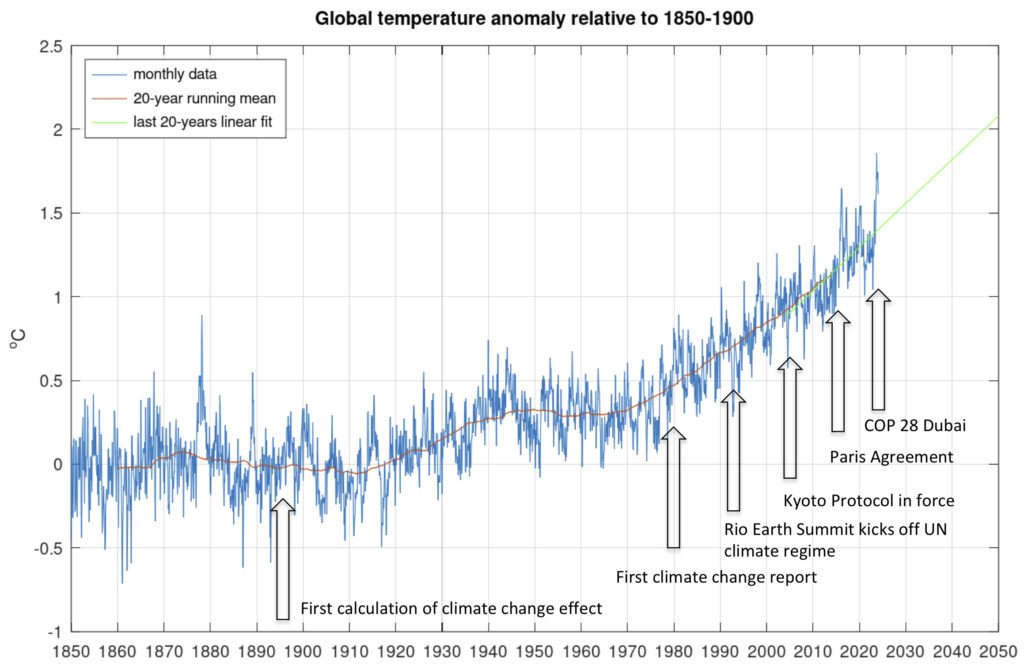During my early career at the Max-Planck Institute for Meteorology based in the port city of Hamburg, I had an outspoken colleague who had previously worked as chief officer on various trade ships. He liked to mock at our profession’s lack of seriousness, given the – to put it mildly – light-touch consequences of missteps, like putting errors into our models’ computer code. But he was still happy to take home the extra pay and the comfort of not having to worry about real-world navigation errors and the possible catastrophic effects they could result in.
Now in hindsight I find that his prescient remarks had been both spot on and far off the mark. Spot on, because typical climate scientists’ nitty-gritty small-scale detailed work on this and that aspect of their increasingly complex models has indeed only very limited consequences for the real world. So his point about them being ridiculously overpaid is still valid. But in a different sense he was very wrong. Rather than sloppy coding practice, it is this very focus on ever increasing detail, dictated by the relentless pressure to publish and to be at the forefront of “scientific progress”, which is creating serious problems in the real world.

Figure: Climate warming really kicked off ever since we’ve been writing climate reports. And warming has been more rapid over the last 20 years (slope of green straight line), than ever before (upward slope of red curve). Warming will accelerate above the green line until we approximately halve global CO2 emissions, which are still rising. Source: Berkeley Earth Land and Ocean Data (air temperature anomalies over sea ice).
The problem for humanity is that this very focus on the details has spilled over into the public debate about the impending climate disaster: degrees of warming, greenhouse gas forcings, carbon budgets, net zero, emissions targets, “zero emissions commitment” (I let you look up the meaning of this bizarre term) and, increasingly, geoengineering. On the impact side it is about wildfires, droughts, heat domes, floodings. These are all very valid discussions, but, as David Spratt and Ian Dunlop spelled out years ago, the biggest threat for humanity is not a warming planet, but a “failure of imagination”. Because climate is not just about carbon budgets, heat waves and storms, but also about the risk of unravelling the fragile and highly complex social web we have created on this planet. As Jem Bendell, known for his “doomer” views on impending climate-triggered collapse now lays out in his latest book, what we are facing is an ongoing decline – if not collapse – of a myriad of social and ecological systems that underpin modern consumer society. And such unravelling can easily and suddenly turn violent.
To understand how serious this threat is, all you need to do is look at the unfolding security crisis in Europe, which is about to turn the continent into the most volatile region of the globe. Until recently, riding on a wave of media-created optimism, discussions were about supplying this or that system of “wonder weapons” more or less rapidly, cushioned in pledges to help Ukraine “win the war”. Now that it is becoming clear that it is the Ukrainian side that is losing, the former optimism is rapidly swinging over into increasingly belligerent panic mode. But what never entered the mainstream dialogue entertained by our political and media elites is the fundamental question about the veracity and wisdom of the underlying notions about the nature of the problem. It is never asked whether the confrontation unfolding in Ukraine may not be a problem to be “solved” by increasing militarisation, but a much deeper one about maintaining security structures in the face of declining NATO and Western hegemony.
Much the same basic pattern unfolds when it comes to confronting the climate crisis. Our political system reacts with policy measures like emissions trading schemes, subsidies for electric cars, grand plans for “green hydrogen”, and general but distant pledges to “reach net zero” in order to solve the problem. But what never enters the general discussion is the question whether our already fragile global power and security structure could withstand a situation of either escalating environmental impacts or a fundamental reshuffling of current power balances. Because the power structures that have so far maintained a certain degree of security, albeit at the expense of the less privileged, will inevitably fall apart once their foundations shift, and those foundations are inextricably bound to over-exploitation of natural resources and the mass use of fossil fuels. In other words, there is the possibility that the tenacious clinging-on to the status quo that has brought about this colossal, decades-long failure of climate policy could simply be the result of our elites’ inability to even imagine shifts in the global power structures on which they ultimately depend. If that is so, we as citizens are the victims of an unconscious process of disavowal that has its roots in a self-defence mechanism of the rich and powerful.
Politicians are good at taking measures, or at least at appearing to do so, the media are good at taking up stories that grip their readers, by stoking fears or feeding into prejudices, and scientists are good at devising complicated models, weighing complicated arguments, and making balanced statements about what is scientifically sound and what not. But none of them are good at imagining the unimaginable, that it could be their very mode of thinking that is putting us in danger.
So when helping Ukraine fails, we have to continue along the same lines, ramp up the stakes and send troops on the ground – unravelling what has remained of a European security structure, risking nuclear armageddon. When the UN’s climate negotiations fail again and again to produce meaningful results, we have to bring in more money from the corporate and finance sectors and essentially outsource the problem to the oil and gas industry. Only that those strategies repeat the same mistakes and will further aggravate the problem, sending us on a mission where increasing climate impacts lead to more and more erosion of social coherence and trust among global actors, making societal collapse the only option for ending the incessant build-up of planet-heating greenhouse gases.
Hans Joachim (John) Schellnhuber, the now retired founding director of the Potsdam Institute for Climate Impacts Research, has warned of the dangers of “professional blindness”, or “Betriebsblindheit” in his native German, pointing out how most climate scientists failed to see the forest for the trees by constantly focusing on details and shying away from obvious but painful conclusions. Add to this a general fear of being wrong or sounding alarmist, and you have a perfect recipe for ignoring reality. This fragile connection to reality affects not only climate scientists.
We should not kid ourselves: the looming danger of planetary heating is that seismic shifts in our global society will be inevitable, brought about by a combination of voluntary or forced adaptation and impacts, and that a hapless elite, unable to face reality, will sleepwalk us all into catastrophe.





